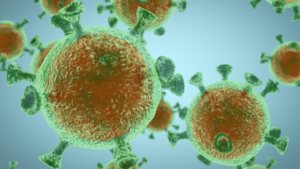
In Brazil, a variant of SARS-CoV-2 (known as P.1) emerged that was first was identified in four travelers from Brazil, who were tested during routine screening at Haneda airport outside Tokyo, Japan. This variant has 17 unique mutations, including three in the receptor binding domain of the spike protein. This variant was detected in the US at the end of January 2021
Researchers in southern Brazil said they have discovered patients infected with two different strains of the new coronavirus simultaneously The patients, both in their 30s, were infected in late November with the P.2 variant of coronavirus identified in Rio, also known as the B.1.1.28 lineage, and simultaneously tested positive for a second variant of the virus.
While the implications of this additional strain are unknown at this time, the P.2 variant is closely watched because two individuals in Brazil who were previously infected with COVID were reinfected with the P.2 variant.
Their symptoms were reportedly mild, with a dry cough in one case, and coughing, sore throat and headache in the second. They did not require hospitalization.
It is unclear whether this variant is more resistant to vaccines and antibodies gained through previous COVID infection. According to the U.S. Centers for Disease Control and Prevention, the Brazilian variant contains a set of mutations that may affect its ability to be recognized by antibodies.
“New case counts are down from a month ago, but these variants remind us to remain vigilant,” said State Health Director Dr. Elizabeth Char. “The more the virus is able to infect people, the more opportunity it has to mutate, so it behooves us to prevent infections. We all know that is done by wearing masks, maintaining physical distance, avoiding large gatherings, and getting vaccinated when it is our turn.”
While the P.2 variant is still being studied, people previously vaccinated or previously infected are not expected to become seriously ill if infected with the P.2 variant. The P.2 variant is thought to have originated in Brazil. It has been found in several mainland states and Europe.
The P.2 variant has thus far been detected in one individual who lives on O‘ahu. “That individual recently traveled to the U.S. mainland,” said Acting State Epidemiologist Dr. Sarah Kemble. “That person is in isolation and known close contacts are in quarantine.”
Another variant of concern is associated with an increase of COVID cases on Maui. The B.1.429 variant, previously called L452R, was first detected in Hawai‘i almost four weeks ago. On February 2, 2021, the Department of Health (DOH) announced seven known cases on O‘ahu, one case on Kaua‘i, and one case on Maui.
The B.1.429 variant was first detected in California in December. It has become the dominant strain in California and is found in more than 40 other states. The B.1.429 variant may be more transmissible than other COVID strains but there is still much to learn about this variant, and it is still considered “under investigation” by the U.S. Centers for Disease Control and Prevention (CDC). It is not clear how effective current vaccines are against B.1.429.
Also, three additional cases of the B.1.1.7 variant are confirmed on O‘ahu. This brings the total number of B.1.1.7 cases in Hawai‘i to six. All six are on O‘ahu and are household contacts.
“The P.2, B.1.429, and B.1.1.7 variants were discovered as part of proactive statewide surveillance conducted by the DOH in collaboration with private hospitals and independent clinical laboratories,” said State Laboratories Division Director Dr. Edward Desmond. Hawaii currently leads the nation in the percentage of specimens which are sequenced and sent to the international GISAID (global initiative on sharing all influenza data) database.
Discovery of variants by DOH helps in that patients identified with variant strains can be the focus of the most rigorous contact tracing efforts.